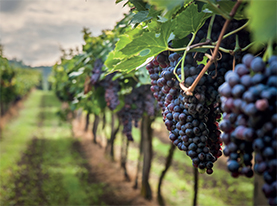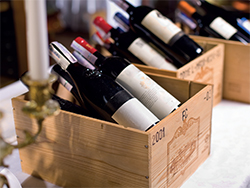 Wine remains attractive to investors because of the steadiness of the market and the growing scarcity of some of its most sought-after bottles. But investing in wine is not straightforward – challenges range from avoiding scammers to identifying which grapes are likely to reap returns in future
Wine remains attractive to investors because of the steadiness of the market and the growing scarcity of some of its most sought-after bottles. But investing in wine is not straightforward – challenges range from avoiding scammers to identifying which grapes are likely to reap returns in future
With the value of fine wine increasing by 13% during 2020 and 127% over the past decade, according to a report by Knight Frank, investors around the world are raising a glass to this luxurious but accessible asset class.
“With a couple of quite noticeable caveats – such as the Asian wine boom and the crash after the 2008 financial crisis – wine is an incredibly steady asset,” explains Tom Harrow from online wine trader Honest Grapes.
“It’s not correlated to the financial markets, so even when there have been massive dips or rises, wine remains pretty constant.
“We would call it a defensive hedge investment. If you’ve got a client, for example, who has a fairly sizeable crypto portfolio, the moment that portfolio is up, cashing out and putting some of that into wine offers a hedge in a very stable market.”
Harrow also points out that, unlike art, cars or watches, wine is a depreciating asset in the sense that if you use it, it is gone. Taking your classic car for a drive or wearing your Rolex Daytona doesn’t materially affect their value. But opening a bottle from your collection removes it as an asset.
For the wider market, however, that increases the scarcity of fine and vintage wines. “That scarcity means the few bottles that are left gain in value.
The longer you keep your wine – as long as you’re making sure you’re keeping it within its drinking window – the more it’s going to go up in value. It’s as simple as that,” Harrow says.
Tax matters
Another key attraction of wine compared with other alternative asset classes is that it’s not subject to the same tax requirements. So long as you buy the wines in bond, you don’t have to pay duty or VAT. But what exactly does ‘in bond’ mean?
“The government gives licences to particular logistics and storage companies, and part of those businesses will have bonded warehouses within their framework,” explains Ben Dawes, Managing Director of Richard Dawes Fine Wines.
“If you’re importing alcohol, the product can enter the UK into a warehouse that’s regulated by HMRC, meaning it can arrive duty and tax free.”
“When you’re trading wine, you should sell it in bond, meaning any future liability is passed on to the buyer,” adds Harrow. “All in all, wine is a very tax-efficient asset.”
He adds: “Crucially for investors, wine isn’t subject to capital gains tax (CGT) either. That has come under review several times in the last five years, but the Revenue and the Exchequer are showing no interest in applying CGT to wine because it’s considered a chattel, or a wasting asset.”
On the flip side of these benefits, wine is not a registered or regulated industry. This means that investors are not protected by the Financial Services Compensation Scheme should something go wrong. As a result, it’s important that anyone considering investing in wine does their own due diligence to safeguard themselves.
“Research, research, research,” says Dawes “Do your due diligence on any business you might be working with. Check their balance sheet and only work with those that have a good track record.
“Anybody offering you guaranteed returns is probably somebody you’d want to do more research on or steer clear of altogether.”
Harrow agrees. “It’s imperative that you work with a trusted, recognised merchant, broker or portfolio manager,” he says.
This is especially important, he adds, because so much wine investment is about buying pre-release, or en primeur. “This means you’re buying before the wine is bottled.
"We’ve just completed the Bordeaux 2020 en primeur campaign and we’ve been selling through that vintage extremely well, but those wines will not be physically available or shipped until 2023. So, there’s a lot of trust there,” he explains.
“There have been some scammers who’ve taken people’s pension cash and not spent it on the wine. Then, two years later, they’ve disappeared. That’s why you very much have to work with professionals who have a good track record and industry credibility and recognition.”
Although finding a reputable partner can help you navigate the pitfalls of investing in wine, there are some who successfully go it alone.
“We’ve got a customer who buys straight from us and 10 or 15 other merchants in the UK,” says Dawes. “He spends a lot of time researching the market, as well as the brands and wines one would want to follow and purchase in an investment arena, and goes about it himself.
“He speaks to us regularly in terms of trying to garner more information, just to make sure he’s buying and selling the right wines.”
For those opting to go down this route, Dawes recommends Cellar Watch, which used to be owned by Liv-ex, the global marketplace for the wine trade.
“You plug information into the database – the cost price of your purchase, how many bottles you bought and so on – and from it you get a valuation every month, so you can watch your cellar moving up or down in value.”
 What’s hot and what’s not?
What’s hot and what’s not?
So, what about those making their first foray into this field? “We suggest a pretty diverse portfolio, probably more diverse than many would recommend. And we suggest you have an annual budget in mind – your discretionary spend for the year,” says Harrow.
“Typically, a client would come to us with an annual budget of £8,000 to £12,000. We’d say that is a good jumping off point.
“When people are starting out, we often suggest they prime the pump, as it were, meaning they might want to spend anywhere between 50% to 100% of that just to get immediately involved.”
As for which wines experts recommend including in a portfolio in order to maximise future gains, Harrow strongly believes that Italy is on the march.
“I’ve been banging the drum for Italy for a number of years,” he continues. “Global interest in wines from Piedmont is really picking up and they’ve got some absolutely fantastic vintages that will be available soon.
“In September and October this year, there are going to be some superb 2018 and 2019 vintages coming out from Tuscany that are very well scored but have remained under the radar. I think they’re going to become increasingly significant in portfolios.
“We’re also always advising clients to look out for the top champagnes,” he continues. “Vintage Krug, Dom Perignon, Henri Giraud. People don’t identify champagne as being an asset wine, but it really is because it lasts for such a long time and it gets drunk so quickly.”
Dawes agrees. “Champagne has been doing very well over the last few years. Big brands like Louis Roederer and Cristal are wines that people should definitely be keeping an eye on.
“When it comes to Bordeaux, Château Canon, Château Rauzan-Ségla and Vieux Château Certan are some hot names that people are really following at the moment. Those are three wines that people are really chasing right now alongside the first growths in Pétrus and Le Pin,” he adds.
“Down in Spain, follow Vega Sicilia’s Unico, and in Italy the likes of Sassicaia and Ornellaia and Masseto are doing particularly well. Out of those three, Sassicaia, is on a real run.”
Sassicaia – a Bordeaux-style red – crops up again during conversations with these connoisseurs, in relation to keeping a weather eye on portfolios in case particular lines within it are peaking.
“A classic example of this,” says Harrow, “was when Rihanna was ‘papped’ swigging a bottle of 2003 Sassicaia. If that was within your portfolio, it might have acted as a trigger point for you to cash out because it suddenly spiked.”
Occasions such as this are rare, however. As such, Harrow suggests purchasing cases “that you’d be very happy to drink if the returns after, say, five, six or seven years aren’t as exciting as you’d hoped”.
That, according to Harrow, is the ultimate joy of investing in wine. “The worst possible outcome is that you’re going to end up with a cellar of gorgeous, mature, high-scoring wines to enjoy yourself.”
Cheers to that.